While BMW has had a presence in the United States for decades, the 1980s was when the brand really became a force to be reckoned with. With models like the 318 selling like hotcakes, BMW tapped into the young people with money segment. Other automakers desperately wanted a piece of that pie. Ford’s stab at that market was the Merkur. If you favor your Ford products with a German accent, then take a look at this 1987 Merkur XR4Ti for sale on craigslist in Asheville, North Carolina. While quite rough around the edges, the owner is willing to take a paltry $1,500 for this interesting import. Thanks to Pat L. for the tip!
During the 1980s, the definition of a luxury car was in flux. Before, huge land barges roamed the Earth. Their pillowy rides and soft suspensions made luxury travel by automobile comfortable and relatively slow. As Euopean brands gained more market share, Americans fell in love with their efficient but still relatively powerful engines, taut handling, and aerodynamic good looks. Domestic drivers were still suffering from low speed limits, but cars that were built for the autobahn sure were fun to drive.
In that decade, Honda, Toyota, and Nissan introduced the Acura, Lexus, and Infiniti brands to capitalize on this increased demand for sporty luxury cars. Their initial products were mostly based on models already in production. They did, however, boast numerous changes that made them almost indistinguishable from their more pedestrian roots. Ford took another route. The company decided to import cars from their already successful German product lines.
In 1985, the XR4Ti coupe was introduced. A sporty sedan called the Scorpio followed in 1987. The coupe was a rebadged and somewhat restyled version of the European Sierra XR4i. Ford couldn’t use the Sierra name due to its use in North America by General Motors. Therefore, the car was renamed the Merkur. Merkur being German for Mercury. There were modifications that went beyond the badging. Five MPH bumpers, US compliant headlamps, and a gauge cluster in the superior American measurement system (rather than metric) were added.
The engine used in the European versions would not pass emissions testing in the United States, so the 2.3 liter turbocharged four cylinder that powered the Mustang SVO and the Thunderbird Turbo Coupe was used. Ford’s 2.3 liter was a good choice. It had been in production for a number of years, speed parts were (and still are) available due to the engine’s widespread use in racing, and the overhead cam design had a reputation for durability. A five-speed manual transmission or a three-speed automatic were your shifting choices.
Sadly, the Merkur brand didn’t last very long for multiple reasons. The exchange rate between the dollar and the mark caused pricing problems, the XR4Ti was similar in size and mission to the Ford Mustang, Lincoln-Mercury dealers were less than enthusiastic about selling a jellybean shaped sports coupe, and the styling just never caught on in the United States. The party was over by 1989 after years of slow sales and the prospect of having to add airbags or active restraints to the cars for the US market only.
You can’t help but think an opportunity was missed here. The Sierra was a very popular car in Europe, and it saw a tremendous amount of racing success. If Ford had softened up the styling and sold them through Ford dealerships that received a lot more foot traffic, then maybe the Merkur brand would have a chance. In the years since the Merkur left Lincoln-Mercury showrooms, Mercury has gone to its reward as well. Lincoln is still floundering along trying to figure out what it wants to be. All of the domestic manufacturers want a piece of the luxury import market. The sad thing is that only Cadillac has come close. It is just that buyers haven’t rewarded the brand with the sales they desire.
As for this Merkur, it has seen better days. There is rust through in the area of the spare tire well and one of the seat mounts. Nothing that can’t be repaired, and the rest of the pictures of the undercarriage seem solid. A lot of spare body and mechanical parts are included with the sale. Bring a truck, because you will take with you almost every body part, a spare engine and transmission, and various other bits and pieces.
A quick look at some of the websites that sell Merkur parts reveals that many of the parts they sell are used parts. With the number of extras that go with this car, my guess is that it will end up being a parts donor. It currently does not run and the cost to refurbish all of the bits and pieces in the interior alone would be a king’s ransom.
That is a pity. A nice Merkur XR4Ti would still be a very useable and fun car to drive. Some of the Merkur parts websites sell kits to extract a lot of horsepower from the engine. Hopefully someone with some creativity, auto body skills, and a Ricky Bobby level of desire to go fast will pick this one up and make a BMW killer out of it. The potential is there, just as it was when these cars hit America’s shores.
Do you think Ford should have stuck it out with the Merkur brand? Please tell us your thoughts in the comments.
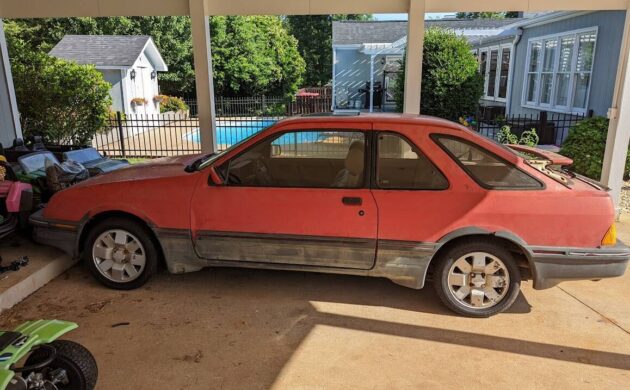
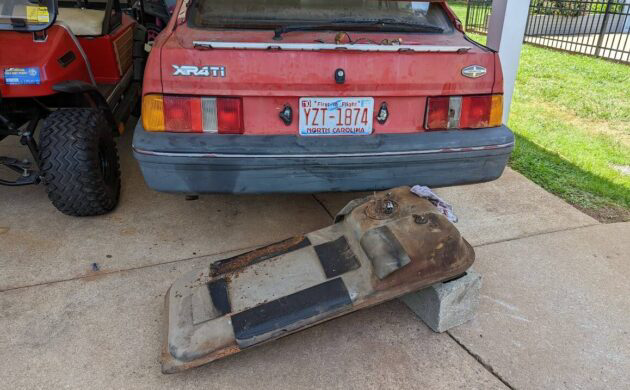
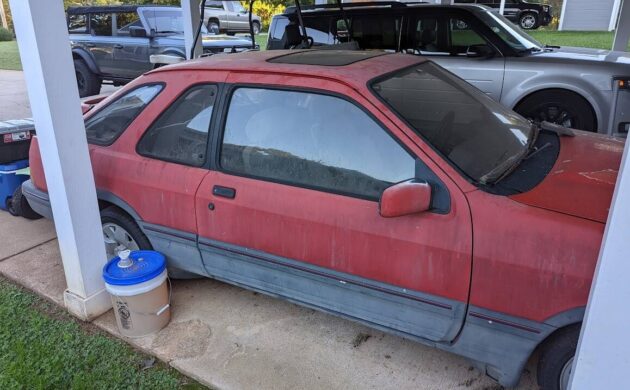
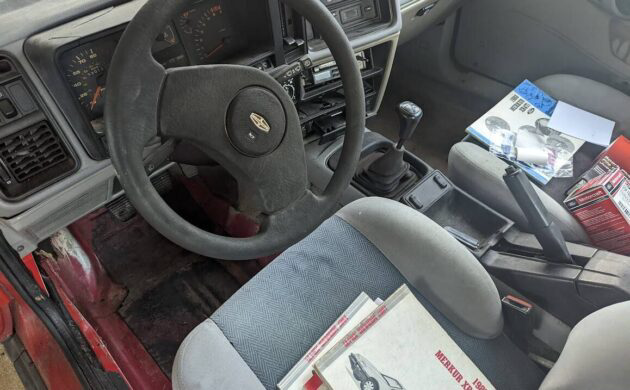
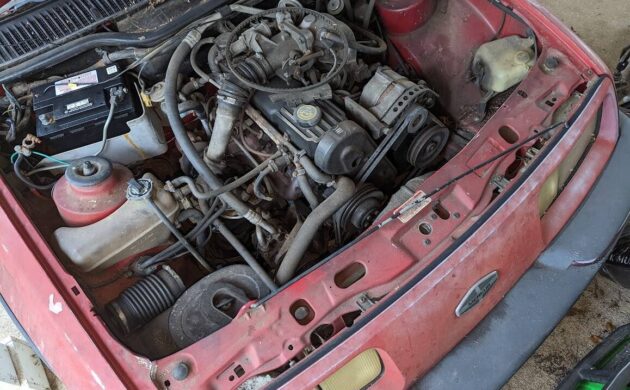
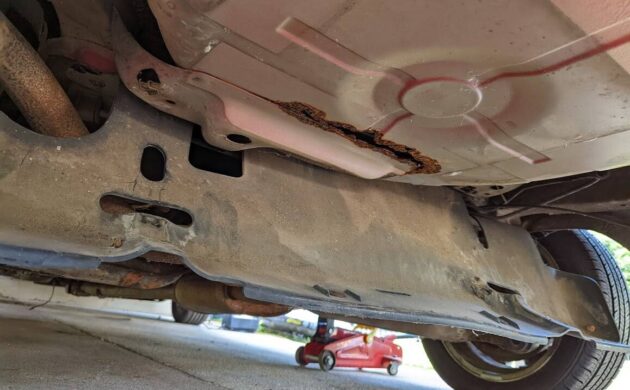
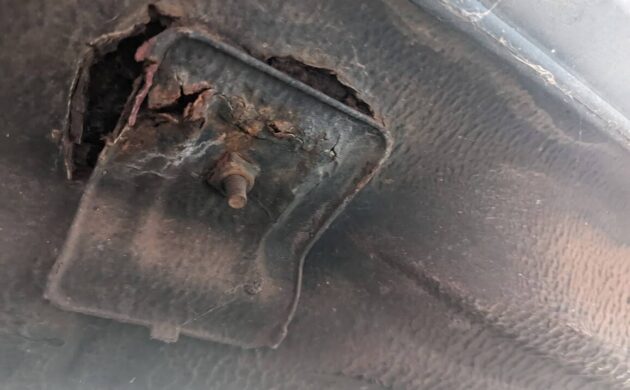
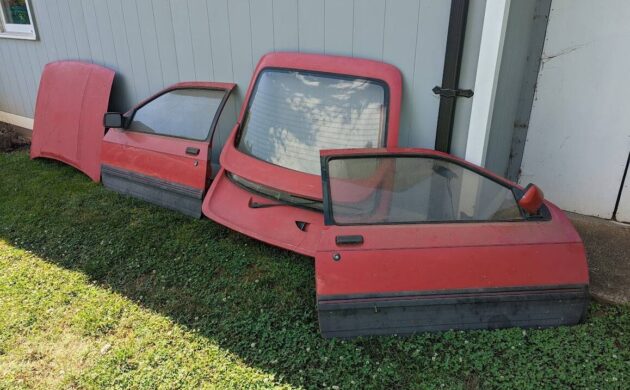




I tried to get behind the XR4TI when they were new. They were not that exciting to me. I preferred the Scorpio looks and oddly it did have the Cologne V6 that the Sierra had in Europe. They sold fewer of those copies in the states so I’m not sure it was only the EPA certification issues that kept that engine out of the XR4 engine bay. More likely is was due to the bigger HP numbers from the 2.3 4cylinder. What we ended up with was a watered down Sierra Cosworth and yes that engine would be cost prohibitive to build and EPA certify.
Did these cars come in anything besides red? I don’t remember ever seeing one in a different color.
I remember silver, white, black, and a light blue metallic in addition to the red there were probably more.
Also a bronze metallic color in later model years, as seen on an ’88 featured here a few years ago.
My ’85 was silver, most I recall were white. The first one I ever saw was a nice medium blue.
They also came in a Dark Blue,which is my favorite
color on these.
Had a white one.
“superior American measurement system”, the joke of the month here.
You know that today and since a long time only 3 nations still use this
thumb-per-pi system whose all 3 of them are 3rd world countries.
The usa, Myanmar and Sierra-Leone. Make my day.
Actually, the US system is aptly called “Freedom” Units – freedom inches, freedom feet and so on.
Seriously, 5 minutes of research would’ve told you that the Metric system is the preferred system in the US by scientists, medical personnel, engineers of all kinds and in most of our newer vehicles.
So your fake rage is unwarranted and sad.
Did I make your day?
Are you gonna move to a first world country now?
Yeah. They tried to ram the metric system down our throats, way back when. How’d that work out?
I have a Litre of rage now
I learned the metric system starting in first grade circa 1968 in Ohio’s public school system. Used it in science classes all through school. Went to college and “became a Mechanical Engineer”. Actually I was born an engineer (many people don’t comprehend how that works). Companies that I have worked for have used both Imperial and Metric units. But when it really comes down to the number crunching, Metric was always the preferred system of choice.
Yes, well, it’s “funny” to me how the switch to selling liquor (wine, etc.) by the liter favored the producers, not the consumers.
However, at least we aren’t buying petrol (gas) by the liter (yet).
NOT “ENGINEERS OF ALL KINDS” use the metric system. I design drilling rigs and when we get drawings for an overseas company.. the first thing we do is convert all of the measurements from metric to Imperial. Been doing it for 35 yrs now. I’ve never seen it go the other way.
The UK still measures road distances in miles. There are signs at the land border with Ireland reminding drivers of the change in units. It was one of the carve-outs the UK got when they joined the EU, along with continuing to sell beer in pints. (And now, of course, Brexit, so it’s all irrelevant.) And colloquially people still measure human body weight in stone (1st=14lb).
Dinosaur brexiteers in UK govt are trying to bring it back. And every scientific and professional body is trying to stop them.
Superior by a long long way. Need proof? There are 2 kinds of countries on Earth. Those that have been to the Moon, and those that use the metric system.
China doesn’t use metric?
These were nice cars but should not have been sold by Mercury dealers.The 5sp trans…if good…is worth the price of the whole car.
Agreed. These should have been sold at a Ford Dealership. Right next to the Mustang.
Our nanny state government has killed off a lot of automobile designs. The XR4TI was just one of many.
Call jim rome 📞
I was waiting for someone to mention that! He has the best XR4TI story ever.
Matt G. – Yes, they came in other colors. I checked out a White one (when it was about three years old) at a Ford dealer in suburban Atlanta. The key was in it, I got in to crank it over, and got a wheeze and a cough, then it DIED. I was replacing an Isuzu Impulse (yeah, one of those ‘out of the frying pan into the fire’ kinda things). My own belief was that Ford should’ve kept Mercury (and Volvo, too for that matter), but utilize the European Ford makes for the American market as Mercury autos. Probably cost prohibitive. One can dream.
The XR4Ti was not just “similar in size and mission to the Ford Mustang” but also to its fox-body twin, the Mercury Capri still being sold in the same Lincoln-Mercury showrooms at that time.
In hindsight, they probably should have just axed the Mercury Capri and, once again as before, made Capri their Euro-Ford import brand in the US market, leveraging the residual familiarity and goodwill of that name here rather than inventing the confusing and unintuitively-pronounced Merkur marque. Then later they’d add a Capri Scorpio, and eventually perhaps a Capri XR2 or Barchetta (aka the ’91-94 Mercury Capri roadster).
This would have allowed them to transfer the old fox-body Capri’s handsome boxflared fenders to the Mustang when they gave it a facelift for ’87, which would also help recoup their tooling investment in that body variant.
I test drove a used one in Chico,California,& thought it
was a fun car to drive,but the seller wouldn’t accept my offer
for it.Not sure if he did me a favor,or not.
When my low mileage ’68 Cortina,I thought about buying
one of these,but after looking at owner’s comments on the inter-
net,I passed,as the conclusion was that anything & everything
can (or will) go wrong on them.
Sold in Australia as a Ford Sierra with 2.3 Cosworth with a 4wd option. Successful rally and race cars in Australia with a couple of good campaigns in the Australian supercar series.
Sierra was a great car in Europe. But there are many such cars which were much less good when they had been federalised?
Yes, well, it’s “funny” to me how the switch to selling liquor (wine, etc.) by the liter favored the producers, not the consumers.
However, at least we aren’t buying petrol (gas) by the liter (yet).
I bought one of the first batch of Merkurs in the States. In 1985 BMW was still in eta mode and my other candidate was a turbo Saab. We had a Sierra rental in Germany and liked the size and general comfort, etc.
One of my service trips to the dealer included a branch and fruit from my lemon tree on the roof, clamped down by the sunroof.
The final assembly was done by Karmann and I think that this was one of the hand-built learning examples. A/c, split leather rear seating, and trans issues were starters.
The trans was the French-buiilt 4 speed used in the Capri with a fifth gear tacked on the back like an overdrive. Mine would pop out of fifth on decel, sometimes. I used a bungie cord to hold it in gear. A dealer rebuilt the trans but no real improvement but I did find an aftermarket shop that also dealt with SVOs, installed a Borg Warner T5. Then the turbo coked up, despite synthetic oil and water-cooling.
The “seller” would have to give me more than $1500 to take this. Mine was a black NorCal car so no body issues. This one doesn’t need a car crusher, it is self-crushing.
I had the Scorpio 5 door – what I really liked about both of these models is that they don’t LOOK like a hatchback – but when you put the back seat down in the Scorpio and raise the back lid, the car had a very impressive amount of cargo space, with the high roofline continuing to the back, and when you raised the back hatch the part that looked like the trunk lid also came up, so there was a big opening to the back..The Scorpio sedan had the moonroof, and the front seats had this manual “squeeze bulb” inflatable lumbar support that was strong and simple to use, and you would just push the button at the end of the bulb to let the air out – very “Germanic”. The Scorpio also had excellent highway manners – it was Autobahnic and happy at 80-90 mph all day long. The sedan is also quite a bit longer/bigger than the coupe. There’s a guy up in Oregon who deals exclusively in all things Merkur, many new/OEM replacement parts, interior, mechanicals, etc. – not cheap, price-wise, but worthwhile quality, with some parts you would probably be hard-pressed to find, especially stateside – here, his name is Russ Harness, with ‘The Rapido Group’ and they are a good source – you can google “images” for them and see how steeped they are in the brand.
Both Merkur models had surprisingly spacious back seats and legroom. The XR4Ti had the same wheelbase as the Euro-spec Sierra 4-/5-door, which was already reasonably roomy in back even for a sedan. The Scorpio was even roomier, downright vast; I could swing a leg over my knee without any concern for even grazing the front seatbacks, and IIRC the rear seatbacks could even recline slightly.
I have four of these. Mine, ’89 magenta red automatic, 110,000 miles. My wife’s ’88 white automatic, 58,000 miles. Daughter’s ’88 black automatic, 61,000 miles. The black one & white one are rust free, & mine need rocker panels repaired only. I’ve removed the rust & repaired elsewhere. My 4th XR is a winter beater / future donor car, ’87 blue automatic, 120,000 miles. Love these cars. Ya they need maintenance like the old Harley Davidson motorcycles, but is you troubleshoot any new noise, squeak, leak, or change in performance, they are quite dependable.
Ok, where to begin. I owned 2 of them, the reason they didn’t sell well was just not the price. Here is what goes wrong on almost all of them.
1 Fuel guage is never right, it floats all over.
2 Car had poor heat and heat gauge was usually off.
3 A/C high pressure hose is located over the turbo and only lasted a few years.
4 The lower cladding hides the rust in the pinch welds.
5 All the warning lights come one whenever they want.
6 The T9 5 speed could barely handle the 175 hp. If you try to make more HP, it will not make it. The automatic at 70 mph turned 4000 RPM and rear seal will leak.
7 Clearcoat paint didn’t last long.
8 Driveshaft had issues with vibrations because the Guibo will crack or dry out and fly a part.
9 Heated drivers seat wires will break.
10 Radio antenna wire that goes to the back glass will break, no more reception. They did fix that later by using a power antenna.
11 Dash will crack and warp.
12 Shifter would buzz from vibrations.
That were just some of the issue. The good. The seats were very comfortable, good cargo space, handle well for it’s time. They were very cheap on the used car market. My first one was 5 years old with 41K and I paid $3100.00 for it, second one was about 4K.
Good old German quality engineering.
Bought a new Merkur XR4Ti in 1987, red. I was driving over 90 miles/day to/from work and it held up very well. For its day, it was quick and handled well. The only issue I had was an AC hose exploding as the hose ran over the exhaust manifold! Replaced it with a custom hose built to handle high temperatures. I sold it in 1992 and it had over 150,000 miles. The new owner had few issues; he told me it ended up at 250,000 miles when his daughter crashed it.
As a Lincoln Mercury dealer, I loved it, was my kind of car. 85′ and 86′ models were troublesome, but everything was refreshed in 87′ that’s when I bought one for personal use. First thing I si was bypass the wastegate with a simple tube connecting the 2 vacuum hoses which go beween the turbo and the wastegate controller. The performance difference is phenomenal, just make sure you have the highest octane available or you will hear terminal pre-ignition. Cheapest power upgrade in history. The car was a lot different from a Fox body. A sophisticated independent rear gave me ride and handling that reminded me of a Jaguar XJ sedan, very soft on the interstate, but very firm on the off ramp. Mine was identical to the one shown, even to the cloth seats. I knew that the transmission was weak, so I didn’t shift it like a drag racer. I had no problems, sold it with 30,000miles, traded it back in at 70,000 miles drove it on a dealer tag for awhile, sold it again and know it went to at least 140,000 before I lost track of it. Never a major problem and always with the wastegate bypassed. The Merkur XR4ti should have gotten an intercooler and a 4 speed automatic to remain competitive. It remains my favorite car. Retired now I own a 2006 Saab 2.0 turbo, mostly because it reminds me of the Merkur, but is also a convertible. I drive my Fusion if I want to make sure I get back.
Had one years ago! Great car!!!
Lovely looking car. I remember when the Merkur was sold in the USA. While I found the car attractive, I’ve never understood why the name “Merkur” was chosen. Why couldn’t they have sold the car as either a Ford car, like most international markets, or a Mercury car.
Merkur is German for Mercury. That is why they named it that.
I guess ownership was hit or miss. Mine was a big miss.
I had an ’85 and can identify with several of the issues already mentioned. The biggest issue for me was the manual transmission. I did not beat on the car, yet I went through 4 transmissions (2 units plus a rebuild of each) in 2.5 years.
Sure, it was a fun car when running properly, but it felt great the day I traded it in.
this is is much a ford as an opel isa cheb.
Liked this car, would not have bought one then (I was 30 y/o) due t0 weird spoiler. An owner (& wrk friend or other) had one and reported “very fast”. Did
not need to go fast then.
These cars were designed and built for Europeans and except for the engine were European in handling, comfort and driveability. The engines were identical to the early Ford Thunderbird Turbos and were hand assembled in Brazil with 4 bolt mains and other improvements over the standard 2.3 engines used in Rangers, Base Mustangs and the small LTDs.
I personally had at one time, an XR4ti, a base Ranger pickup and a 17ft Baywliner boat with OMC Cobra (Ford) 2.3 engine. The OMC conversion for marine use had about 40 more horsepower and came with a Rochester 2bbl carburetor, Mallory ignition and no flywheel. At the time, it was the only standard marine/auto engine with an Operating RPM of 6000. No turbo.